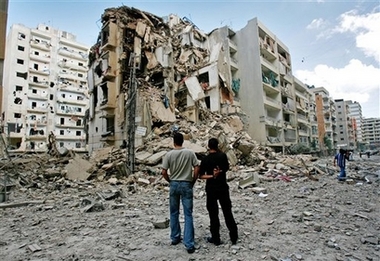Lebanese return home after cease-fire
(AP)
Updated: 2006-08-14 19:19
BEIRUT, Lebanon - Lebanese civilians streamed back to their homes Monday
after a UN cease-fire halted fighting in a monthlong conflict between Israel and
Hezbollah guerrillas that has claimed more than 900 lives and sent people
fleeing on both sides of the border.
Lines of cars - some loaded with mattresses and luggage - snaked
slowly around bomb craters and blasted bridges as people tried to reach southern
Lebanon for their first view of what is left of their homes and property.
|

A couple of Lebanese
Shiite men look at destroyed apartment buildings in the Hezbollah
strongholds of southern suburbs of Beirut, Lebanon, Monday, Aug. 14,
2006,after an overnight aerial bombardment by Israeli forces. Israel
halted its offensive against Hezbollah guerrillas as a UN-imposed
cease-fire went into effect Monday after a month of warfare that killed
more than 900 people, devastated much of south Lebanon and forced hundreds
of thousands of Israelis into bomb shelters.
[AP]
|
The rush to return and rebuild came despite the fragility of the cease-fire.
Just hours after the truce, Israeli troops opened fire on a group of armed
Hezbollah fighters approaching them "in a threatening way," the army said. One
of the fighters was hit, but the army did not say if he had been killed or
wounded.
Some 30,000 Israeli forces remained in Lebanon and Hezbollah's leader, Sheik
Hassan Nasrallah, said the militia would consider them legitimate targets until
they withdraw from the country. The next step - sending in a peacekeeping
mission - still appeared days away.
A Lebanese cabinet minister told Europe-1 radio in France that Lebanese
soldiers could move into the southern part of the country as early as Wednesday.
The UN plan calls for a 30,000-member, joint Lebanese-international force to
move south of the Litani River, about 18 miles from the Israeli border, and
stand as a buffer between Israel and Hezbollah militia.
"The Lebanese army is readying itself along the Litani to cross the river in
48 to 72 hours," said Lebanon's communications minister, Marwan Hamade.
But implementation of the hard-won agreement was already in question Sunday
night when the Lebanese Cabinet indefinitely postponed a crucial meeting dealing
with plans to send Lebanon's half of the contingent to the region.
Lebanese media reported that the Cabinet, which approved the cease-fire plan
unanimously Saturday, was sharply divided over demands that Hezbollah surrender
its weapons in the south.
|